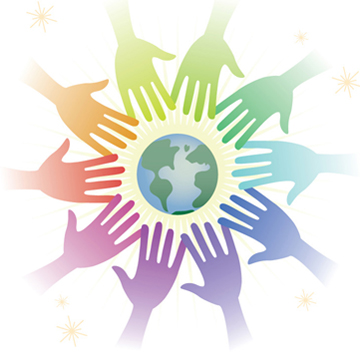Laugh More, Play More!

Whether you are participating in a laughter yoga class, giggling at something funny you read, or laughing out loud at a great joke you heard at a comedy show, laughter is powerful medicine. It can help communities heal, draw people together, and trigger physical and emotional changes that lead to deep healing.
Types of Humor
There are many types of humor. Do you know about each of these types?
- Parody is a type of humor that closely imitates something or someone for a comical effect. It is usually a verbal or physical expression of humor that highlights imperfections to exaggerate behaviors and personality traits. The music of pop satirist Weird Al Yankovic is a great example of this type of humor.
- Satire is similar to parody, but it is the written or dramatic expression of personal, political, and cultural quirks and flaws. It is aggressive humor that pokes fun at social institutions or social policy. The TV show Saturday Night Live offers examples of dramatic satire.
- Slapstick comedy is a type of humor that was common in the days of American Vaudeville when physical farces generated laughs. The Three Stooges and Laurel and Hardy are examples of this.
- The double entendre is a type of wordplay whose expression has two meanings, usually of a sexual nature. James Bond movies are famous for this type of humor.
- Black, or gallows, humor is not a type of ethnic humor but rather a kind of humor that provides protection from the emotional impact of witnessing tragedy, disgusting or intolerable aspects of a situation, death, and disfigurement. Much of the comic humor in the movie and TV show M*A*S*H is an example.
- Irony is described as consisting of two concepts or events that, when paired, mean or expose the opposite of the expected outcome. Examples are buying a diet soft drink and a candy bar or using oxymorons such as “alone together,” “jumbo shrimp,” “honest politician,” or “plastic glasses.”
- Puns are plays on words that use one word to evoke a second meaning, usually based on a homophone (a word with a different meaning that sounds the same).
- The word sarcasm is derived from Greek and French words that literally mean “to tear flesh.” Sarcasm often demonstrates clever wit, is aggressive, and targets an individual rather than an institution.
Humor and Health
Humor is great for your health—on all levels.
- It allows us to play and receive emotional pleasure.
- It brings people closer together, relieves tension, and allows us to communicate in ways we might now be able to if it were not present.
- It relieves stress and anxiety, reduces depression, and can help people cope with anger, frustration, or the heaviness of crises, tragedy, and death.
- It lowers blood pressure, facilitates digestion, increases oxygenation in the blood, increases tolerance to pain, and improves immune function.
What Can You Do to Laugh More?
When was the last time you really laughed? Consider developing ways to laugh more and include more humor in every day of your life. Start with these and then let your imagination go wild.
- Laugh at yourself, and give yourself permission to be human and make mistakes. None of us is perfect, and when we laugh and gently poke fun at ourselves, we lighten up and learn to be less serious.
- Visit a comedy club or listen to humorous CDs on the way to work.
- Pay attention to your own self-talk and replace your negative thoughts with positive ones.
- Collect funny material from comedy writers and comedians. Develop a file of funny jokes, stories, cards, bumper stickers, poems, and songs.
- Wear a funny button, nose, pair of glasses, or hat.
- Tell secondhand jokes or stories.
- Blow bubbles!
- Read more books (fiction and nonfiction) and watch less television.
- Write a story, fable, or poem every now and then to improve your imagination and creativity.
- Share your vision to make others laugh. Laughter is contagious and is needed in all lives. Humor shared is humor doubled.
- Plan to play. Many animals play at least some time in their lives. As adults, we play to relax, to interact with others, to gain a perspective on our lives, and to grow. When we truly play, we seek to impress no one, and we produce no product. We just enjoy being in the moment, being spontaneous, and laughing. Have fun with toys.







